Lecture on “Dynamics of Democracy: Minority Related Questions in Parliament
August 9, 2014 at IOS Conference Hall
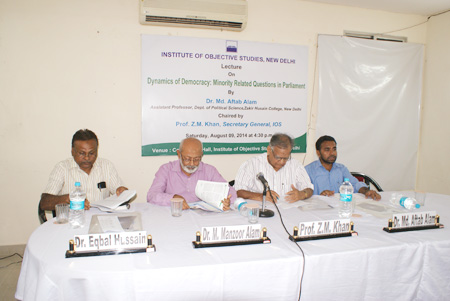
A lecture on the “Dynamics of Democracy: Minority related Questions in Parliament”, was organised by the Institute of Objective Studies (IOS) here on August 9, 2014. Dr. Mohd. Aftab Alam, Assistant Professor of Political Science, Zakir Husain College who delivered the lectures said that the quality of questions relating to the minorities raised in Parliament, was a matter of concern.
Dr. Aftab Alam, who undertook a study on minorities-related questions raised in Parliament during 1991-2007, made startling disclosures about the parties that made tall claims of support to minorities’ cause. He revealed that the Samajwadi Party (SP) that had a greater share of Muslim votes, raised fewer questions in Parliament. That Minorities’ issues had not been given due importance, was illustrated by the fact that the BSP did not raise a single question in the Rajya Sabha, he pointed out. He argued that our MPs were the same people who also represented the minorities who constituted about 20 percent (20 crore) of India’s 1 billion-plus population. Every election, candidates came to voters and made promises. While some were fulfilled, most remained unfulfilled with the assurance that they would be fulfilled in the next election. Even as his paper focused on previous governments, another government completed its term and came out with a ‘common minimum programme’ that made promises to be fulfilled.
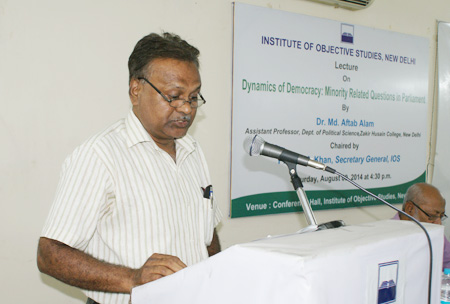
According to the data presented by Dr. Aftab Alam, during the earlier BJP rule, the number of questions relating to the minorities stood at 185 against 217 during the first three years’ rule of the UPA-I. His study spread over a 17-year period indicated that the total number of questions raised in the Lok Sabha relating to the minorities was 170 and the Rajya Sabha accounted for 509 questions. The total number of questions raised in both Houses of Parliament stood at 879. He attributed the indifference of MPs to the minorities’ issues to the lack of their interest in the real issues like equality, security and communal violence. Emphasising that the question hour before lunch was very important as far as the issues of public interest were concerned, he said that representation of minorities could positively contribute to national integration.
Dr. Aftab Alam pointed out that he categorised the issues raised in Parliament according to their importance. He called for critical study of the nature of questions, so that proper assessment of the performance of political parties could be made. He remarked that Parliament failed to debate such questions as were more relevant to the minorities. Noting that compared to the Lok Sabha, Rajya Sabha had higher representation of minority related questions, he said that parliamentarians like Syed Sfhahabuddin, Mr. Asaduddin Owaisi, Mr. E. Ahmed, Mr. K. Rehman Khan, Mr. Obaidullah Khan Azmi, Mr. Meem Afzal and Mr. Abu Asim Azmi raised more questions in Parliament. While 32 percent questions were raised by Muslim members in the Lok Sabha, 36 percent questions were raised in the Rajya Sabha. Similarly, among the mainsteam national parties, while members belonging to the Congress raised 24.5 percent questions, BJP members raised 18 percent questions, he maintained. He said that he was working on the limits of parliamentary democracy in India. Thus the space of inclusion had become part of the study, he added.
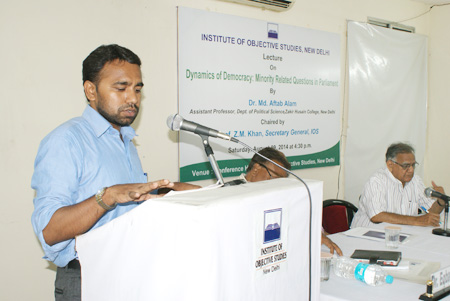
Dr. Aftab Alam reached the conclusion that there was non-participation of minorities in the administrative power sharing. This was a democratic deficit, he said. He pleaded for full utilisation of the question hour for effective implementation of the programmes for the progress of minorities. He stressed the need for reclaiming the question hour so as to fix the accountability of the government. Calling for the development of a data bank on the minorities, he urged the IOS to take a lead in this regard.
Dr. Eqbal Husain, Associate Prof. of Law, Jamia Millia Islamia, who introduced the topic, said that the rights such as right to the expression of thought and belief were guaranteed to the minorities by the Indian Constitution. He believed that the orientation of our parliamentarians was necessary to make the government accountable. This raised the question of parliamentarians’ seriousness towards the plight of the minorities. He suggested that the IOS should study the number and quality of questions concerning the minorities in each session of Parliament immediately after the session was over. Senior journalist, Mr. Mohammad Zeyaul Haque raised the issue of the content of questions and their reply by the government. He opined that action on the reply should be closely monitored.
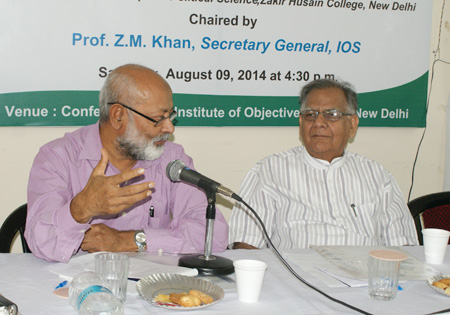
The Chairman of the IOS, Dr. Mohammad Manzoor Alam, sought to know the basis for selection of the period for research. Noting that the Right to Information (RTI) Act, which was an effective tool to elicit information on each and every subject, he said that it found no mention in the paper presented by Dr. Aftab Alam. Commenting on the lack of serious questions that were raised in parliament, he said that the nexus between the criminals and people’s representatives had taken a toll on meaningful parliamentary debate. Referring to the grouse that Prime Minister Narendra Modi deliberately avoided extending Eid greetings to the Muslims, he said that the community should not get swayed by such gestures. Instead, it should strive for securing rights guaranteed to the minorities under the Constitution. He referred to Narendra Modi’s reply to the motion of thanks to the President for his Address to the joint sitting of Parliament in which he had commented that a Muslim family which used to repair cycles three generations ago continued to do the same even today. He wanted to know what stopped Mr Modi from bringing about a change in the life of that Muslim family during his 12-year unbroken rule over Gujarat as Chief Minister. He criticised the BSP for failing to raise a single question relating to Muslims in Parliament despite its promise to support their cause. He held that the promises of the party had turned out to be hollow.
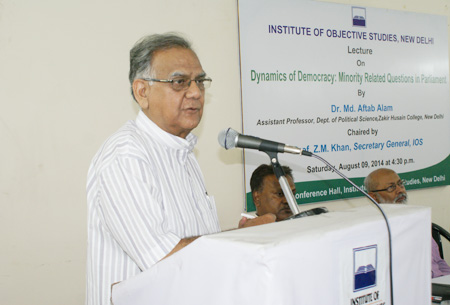
The Secretary-General of the IOS, Prof. Z.M. Khan, who was in the chair, briefly explained the purpose behind organising such lectures. The Vice-Chairman of the IOS, Prof. Refaqat Ali Khan also expressed his views on the occasion.
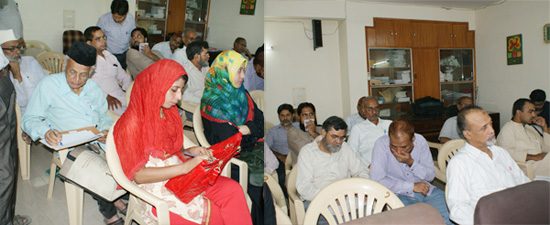
Earlier, Hafiz Athar Husain recited a verse from the Holy Quran to mark the beginning of the lecture.
Those who attended the lecture included Prof. Hasina Hashia, Prof. of Geography, JMI, Mr. Zafar Sadiq, Advocate, Mr. Afroz Alam Qasim, Mr. Shahabuddin Ansari and Ms. Razia, besides prominent citizens, academics, social activists and university students.
Go Back